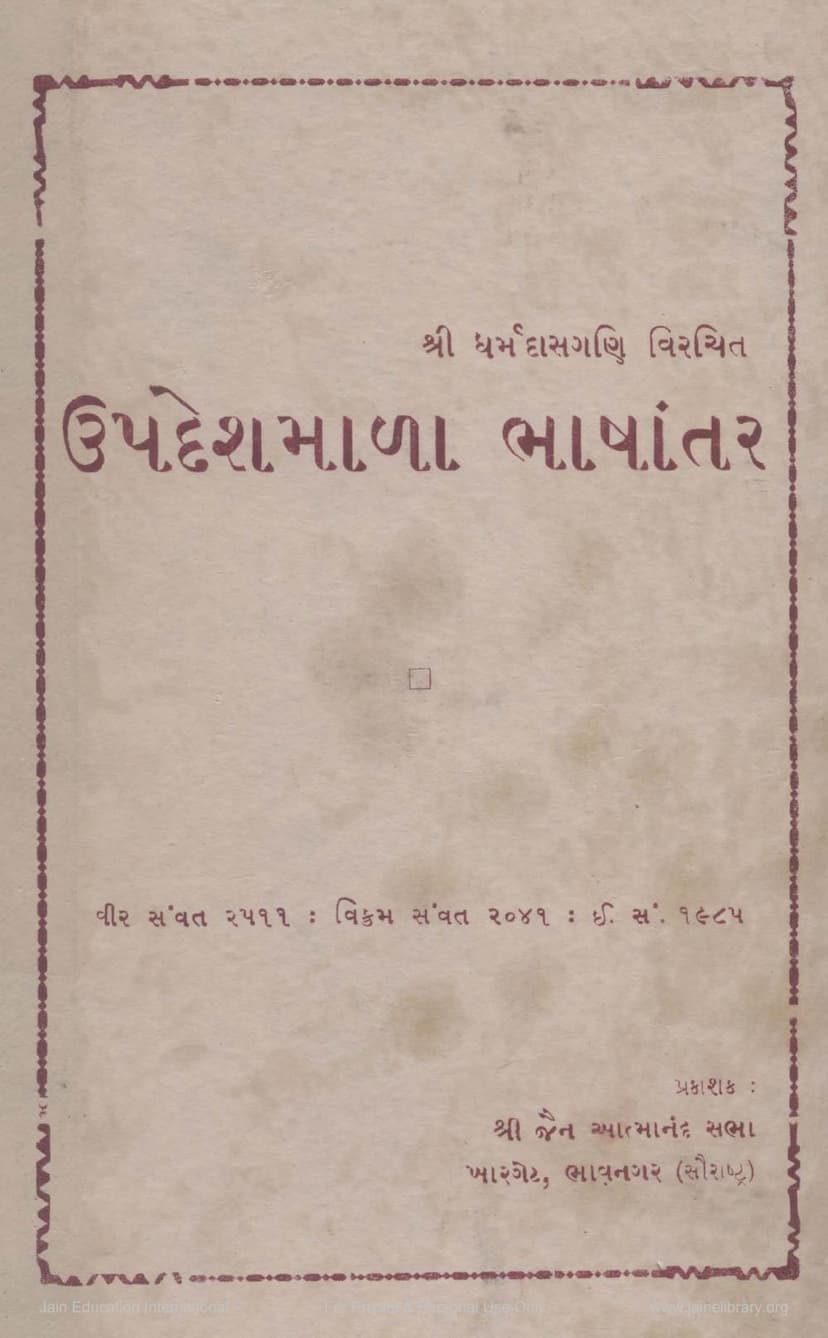Updeshmala Bhashantar
Added to library: September 2, 2025

Summary
Here's a comprehensive summary of the Jain text "Updeshmala Bhashantar" by Dharmdas Gani, based on the provided text:
Overall Purpose:
The text, "Updeshmala Bhashantar," is a Gujarati translation and commentary on the original "Updeshmala" by Dharmdas Gani. The publisher, Shri Jain Atmanand Sabha, Bhavnagar, presents this work with the aim of propagating Jain principles and knowledge. The book serves as a guide for spiritual seekers, offering profound teachings and moral lessons derived from Jain philosophy.
Key Aspects and Content:
-
Author and Translator: The book is authored by Dharmdas Gani and translated into Gujarati, with the translator's contributions and the overarching effort of the Shri Jain Atmanand Sabha. The publication date is noted as Veer Samvat 2511 / Vikram Samvat 2.511 / 1985 AD.
-
Core Message: The "Updeshmala" (and its translation) focuses on delivering moral and ethical guidance rooted in Jainism. It emphasizes the importance of righteous conduct, spiritual discipline, and understanding the true nature of reality.
-
Narrative Style and Teachings: The text is presented in a didactic style, often using stories, parables, and examples to illustrate Jain teachings. It aims to provide "updesh" (advice/teachings) that lead to spiritual upliftment and the attainment of liberation.
-
Key Themes Explored (as seen in the detailed narrative of the first story):
- The consequences of negative emotions: The initial story of Ranasingh, Prince Vijayasen (Dharmdas Gani), and Queen Ajaya highlights how jealousy, hatred, and malicious intent (driven by Ajaya's envy) can lead to dire actions like attempting infanticide.
- The importance of compassion and righteousness: The abandonment of the infant Ranasingh and his subsequent fortunate rescue and upbringing by a kind farmer (Sundar) emphasizes the role of compassion in life.
- The path of renunciation and spiritual pursuit: The story beautifully illustrates the journey of King Vijaysen, who, disillusioned with worldly attachments, renounces his kingdom to embrace Jain asceticism, eventually becoming the knowledgeable Dharmdas Gani.
- The virtues of Jain monks: The text implicitly and explicitly praises the dedication, knowledge, penance, and detachment of Jain monks like Acharya Bhadrabahusagarji and Acharya Vijay Motiprabhsurishwarji, whose lives and teachings are referenced.
- The interconnectedness of actions and consequences (Karma): The narratives underscore the Jain principle that actions have inevitable consequences, influencing one's present and future lives.
- The value of knowledge and spiritual study: The emphasis on monks studying scriptures like Kalpasutra and Uttaradhyayan highlights the importance of acquiring and internalizing spiritual knowledge.
- The multifaceted nature of spiritual practice: The text touches upon various aspects of spiritual practice including fasting (ekashana, varshitap), meditation (yoga), scripture study (svadhyaya), and pilgrimage (Navanu Yatra).
-
Biographical Insights: The book provides brief biographical sketches of revered Jain Acharyas, particularly Acharya Shri Bhadrabahusagarji Maharaj Saheb and Acharya Shri Vijay Motiprabhsurishwarji Maharaj Saheb. These sections detail their birth, initiation, significant life events, and their contributions to the Jain faith, often highlighting their austere practices, profound knowledge, and efforts in propagating Jainism. Their influence is presented as inspirational for the readers.
-
Philanthropic Aspect: The book is published by Shri Jain Atmanand Sabha, suggesting a charitable or religious initiative. The presence of a list of supporting institutions and donors (Page 7) indicates the community's involvement in spreading religious literature.
-
Errata: The inclusion of an "Shuddhipatra" (errata) on page 14 and 15 demonstrates a commitment to accuracy and refinement in the printed text.
In essence, "Updeshmala Bhashantar" is a classical Jain text that seeks to educate and inspire readers through stories and teachings, emphasizing the core tenets of Jainism such as non-violence, compassion, self-control, knowledge, and the pursuit of liberation. It honors the legacy of great Acharyas and highlights their exemplary lives as beacons for spiritual growth.